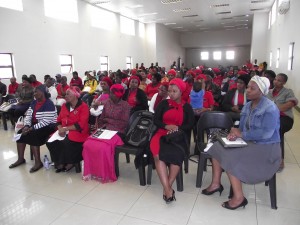5 August 2016
Abahlali Gender equality workshop
Abahlali Gender Equality Workshop 
Sunday, 31 July 2016
The workshop was attended by at least 120 women, men and youth. The workshop was held as a significant mark of closing ‘’men’s month of July’’ and the beginning of August focusing on women’s power and rights.
Purpose of the workshop: For a very long time Abahlali have been very sensitive to gender equality issues. The movement has always had high respect for women and has made an enormous effort to promote and support women’s power and women’s activities within the movement. We have always been clear that the strength of the movement is founded on women’s power. However although all leadership positions in the movement are elected positions there has been a challenge in women occupying leadership position in the movement. At the branch level there have been many women leaders. But at the level of the movement’s overall structures there have always been more men than women in leadership. So the workshop aimed at breaking and exposing the fear of the unknown as well as some of the hidden bearers that we may not be aware of as Abahlali. The discussion was much broader and went beyond the question of men and women and included a discussion on LGBTI rights.
While we have noted how wide, sensitive and sometimes scary this topic could be for some comrades we thought it is worth imagining a human being as an image of one’s Creator. Gender equality was discussed in relation to culture, in relation to religion and in relation to our ever-changing modern world. The question of gender was not only discussed in terms of one’s sexual orientation but also in terms of what is just and equitable in human life. Within the spirit of provoking debate we though it might help us to discuss this question in different levels and different spaces of survival. This includes equality in our families, equality in the work place, equality in our places of worship, equality in property ownership etc as well as equality in struggle and in the movement.
The discussion began with people’s understandings of historical cultural beliefs in the African context. We concluded that some of these beliefs were good and some were bad. Some made women even more vulnerable in the name of trying to protect them, especially in relation to wars at the time. But at the very same time some of the beliefs promoted the superiority of men over women and promoted patriarchy. Religion has had its own contribution to these inequalities in gender issues. We were particular happy to hear the contribution and perspective of our religious leaders and izinduna within the movement and the modern voice of the young people. The words ‘’respect’’ came in several times to try and highlight the important of accommodating and accepting human beings irrespective of gender, race, religion, creed and age. This understanding was in line with what comrades understand of the dignity that we all deserve. It was important to create a space where comrades can express what they feel is right or wrong with our beliefs and behaviour.
The rights of LGBTI people were also discussed in length. The position of the movement was very clear that a human being is not defined in relation to sexual orientation, but rather in relation to other fellow human being, to how we treat others. It is up to individual’s own feelings to determine their living style and behaviour. People shared their experience and understanding. After all it was clear that none of us knew our children before they are born and even as they grow we do not know what the future holds of them. LGBTI people are our children, our sisters and brothers, our aunts and uncles, our neighbours and our comrades. LGBTI people are us. It was therefore acknowledged that LGBTI communities are part of us and that any discrimination against them is as immoral and criminal as any other discrimination against humanity.
Our conclusion was to say ‘’who are we then to judge other human beings?’’. We concluded that our role is to support every human effort to live and realize their full potentials within opportunities available before us all. The movement vowed to continue to open debate so as to familiarize ourselves with bigger questions of this nature. We are committed to promoting full equality between women and men, women’s power in the movement and women’s presence in leadership and in all other spaces in the struggle and in our movement. We are also committed to the full equality of LGBTI people.
